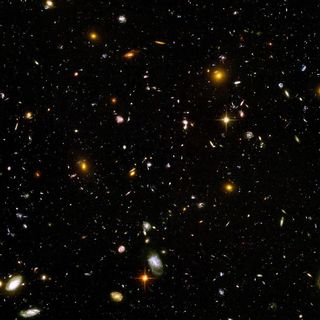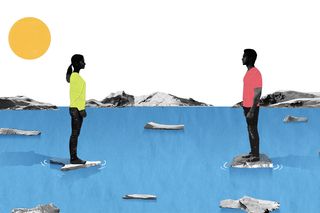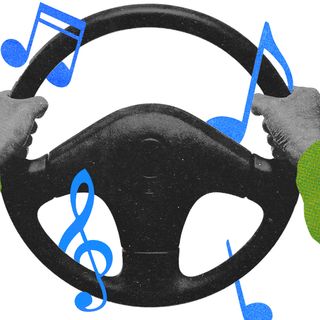
How Climate Change May Be Shaping Our Relationship Choices
“It is a big green flag in relationships if people are attuned to the climate change conversation — it shows they are considerate.”

The world is ending. Who would you pick? Played in whispers, this was a game from high school. The two sentences seemed to be in jarring opposition at the time. Today, on the edge of ecological and existential chaos, they feel relevant again. The world is ending. Who do we pick?
Our relationships don’t exist in silos. We go on dates, hook up, break up, find others, have children, get married, all while heatwaves and floods sweep every corner; love is never absent. Our romantic choices are constantly compelled to respond to the world – one that’s ecologically battered and broken.
For starters, the climate crisis “plays a really big role in what you think your future is going to look like,” said Linda, a team coordinator at Extinction Rebellion. Linda met their partner James through the climate mitigation movement. “Mentally I’m preparing for societal collapse, so it’s just important to have somebody who gets that.”
In another instance, Girish Varma recalls a rather disappointing date. The conversation veered to the evils of overfishing and its contribution to the climate crisis. “[They] said that the ocean is an infinite source of supplies and all the over-fishing stuff isn’t real. That very instant, I lost most of my affinity towards that person.” For many like Girish, such ignorance and apathy can prove to be a dealbreaker. “I wouldn’t want my partner to be someone who says climate change isn’t real.”
***
The environmental crisis strains daily relationships in ways we are slowly beginning to realize. Psychologically, eco-anxiety – which is associated with feelings of anxiety, trauma, and anger in people – has a massive impact on one’s daily life and is thus inevitably bound to affect love and desire. Would someone opt for a sustainable brand over the mass-produced ways of fast fashion? Would they insincerely wax eloquent about the menace of air pollution, while proceeding to commute everywhere in their luxury cars? If the stars align and people get married, what are their views on having children and adopting instead? Growing evidence, statistically and anecdotally, shows that people under the age of 45 are the first cadre to actively think about not having children in order to preserve their future.
But how do people perceive eco-conscious behaviors from a mating lens? Would someone who valued sustainability be more favorably looked upon by a prospective dating partner? Daniel Farrelly, a professor of psychology at the University of Worcester, and Manpal Singh Bhogal, a professor of psychology at the University of Wolverhampton sought to answer exactly this. In 2021, they conducted two experiments among heterosexual people, each designed to understand how ecologically sustainable values changed a person’s desirability. Published in Personality and Individual Differences, these findings, in a very theoretical sense, identified eco-mindedness as a tangible factor in mate choice.
Related on The Swaddle:
How Historical Pandemics and Disease Shaped the Evolution of Our Romantic Choices
They found that pro-environmental behaviors, like recycling, were associated with altruism and increased a person’s appeal. The link between altruism and desirability has been extensively studied in evolutionary theory. Historically too, hunter-gatherer men shared meat more often and had greater reproductive success with women.
The forces of nature and biology viscerally draw us towards those who do good deeds, especially those that come at the expense of individual convenience, like donating blood or laboriously segregating waste. “This theory suggests that altruism may serve, in part, to convey one’s value as a mating partner, including one’s concern for others and the likelihood of cooperating with future mates,” one study concluded. These theoretical findings are echoed in how people navigate relationships in the real world. For Jalasmi, 26, “it is a big, big green flag if people are attuned to the climate change conversation.” To her, it shows “how the person is considerate, understands what’s going on, is aware and informed and empathetic.”
For the young generation of today, climate consciousness has decisively made its way onto the dating checklist today. “Thunberging,” christened after the environmental activist Greta Thunberg, refers to how people are bonding over a grim reality, discussing the threat to the planet just like they would politics or their love for cinema. Dating apps like Tinder and OkCupid observed a 240% increase in how many times environmental or climate change-related terms were mentioned in bios or conversations.
“I think it definitely makes an impact [when someone mentions environment in their profile],” says Mahima Sachdev, 21. “It is much better than someone who is not at all aware of the climate crisis. People who end up making these conversations definitely seem intellectual.”
The climate change world would thus add to the list of dos and don’ts while dating. Do talk about how you bought that cute shirt from a thrift store; don’t say how you love traveling by car or plane. “Someone who is very unaware of the environmental crisis is extremely unattractive … selfish, uninformed, or really privileged,” says J.A., 27.
It can initially feel facetious to speak of romance in the same breath as the climate crisis. The former so personal and fleeting, the latter so public and terribly enduring. In Beautiful World, Where Are You, Sally Rooney drolly wonders: “when we should have been reorganizing the distribution of the world’s resources and transitioning collectively to a sustainable economic model, we were worrying about sex and friendship instead.”
But love doesn’t have to be trivial in the face of ecological destruction; it can be a catalyst for change. Interestingly, research shows people are motivated to take on more ecologically mindful behaviors in the presence of those they find attractive.
Related on The Swaddle:
Eco‑Anxiety Is Fuelled by Helplessness, Anger. Can We Turn Our Grief Into Climate Action?
S*, 25, had a similar behavior-altering experience once. She was talking to someone she liked about her new Zara top when they reminded her of the heaps of waste such companies generate. This struck a nerve in her and, ever since, she found herself more mindful of where she threw her wrappers and waste when she’s out on dates. Although such changes in one’s behavior can seem performative, the mindfulness triggered by the performance can have a lasting impact.
The merger of environmental politics and romance can thus inspire a new wave of shared values – such as prioritizing good air quality and food security over luxury.
“I imagine that romantic partners know infinitely more about each other than we do about strangers,” said one of the authors of a study looking at eco-mindedness among American couples. “So being able to point to the many connections that climate change has to other important issues, whether it be someone’s religious faith and caring for God’s creation or protecting future generations and leaving a positive legacy.”
Rosie, an environmental activist, spoke of how she has been able to get her boyfriends away from the dark side of ecologically-harmful practices. “I’ve been able to see throughout those relationships that (my exes) at least started developing and trying (to be environmentally friendly), which was a positive. I feel like I could influence someone to be more eco-conscious.”
What does love look like at the end of the world? I’m reminded of bell hooks and her beautiful treatise on love. In love, hooks says, we learn to resist, thrive, and lead under any circumstances.
According to Satyabhan, 22, it is as much about intention as it is about effort. He believes that everyone doesn’t have to be perfect, but everyone has to be aware that they have to be conscious. “It’s the decade of action, people. Be mindful of the choices you make.”
Saumya Kalia is an Associate Editor at The Swaddle. Her journalism and writing explore issues of social justice, digital sub-cultures, media ecosystem, literature, and memory as they cut across socio-cultural periods. You can reach her at @Saumya_Kalia.
Related


How Music May Make People Less Cautious While Driving, Working
